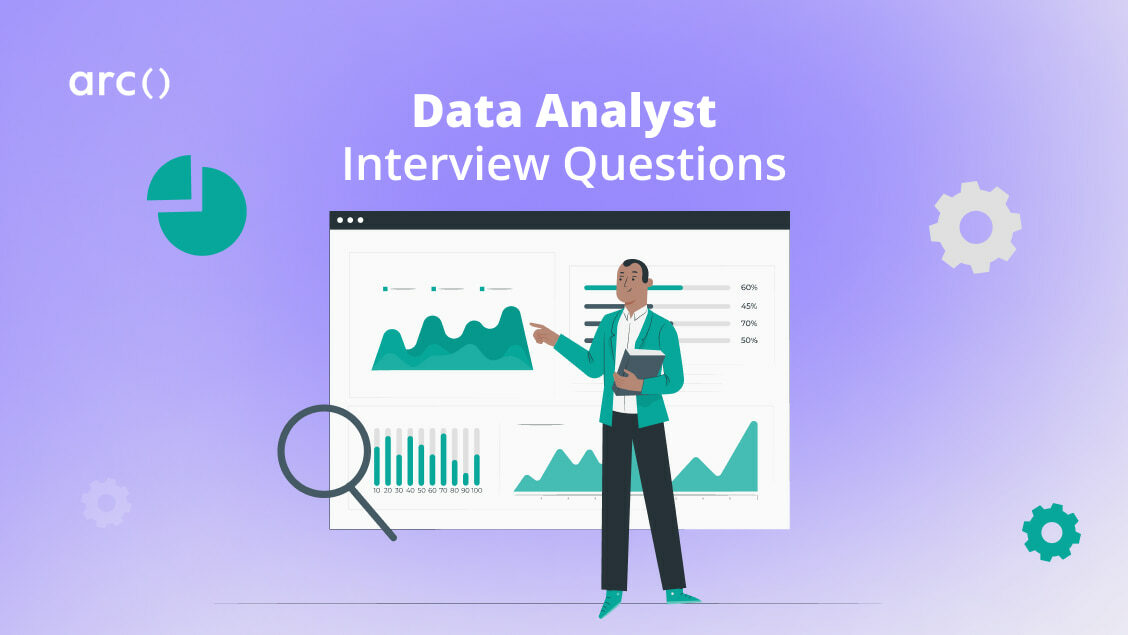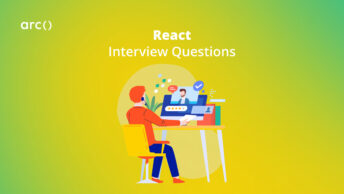The talent to analyze data is highly marketable and may succeed in the public and commercial sectors. Data analysts may find work in almost any industry, including finance, accounting, sales, marketing, healthcare, planning, chemistry, biology, and more. Furthermore, the demand for qualified experts is still considerably greater than the supply.
Python, SQL, and Power BI are the primary programming languages most Data Analysts use. Data analysts must know how to transform raw data into useful information, and they do it by using data analysis methods and descriptive statistics.
This post will walk you through some of the data analyst interview questions and answers you should ask in order to hire the best data analysts.
Looking to hire the best remote developers? Explore HireAI to see how you can:
⚡️ Get instant candidate matches without searching
⚡️ Identify top applicants from our network of 300,000+ devs with no manual screening
⚡️ Hire 4x faster with vetted candidates (qualified and interview-ready)
Try HireAI and hire top developers now →
1. What is the data analytics lifecycle?
At the beginning of every big data project, there are certain questions. What are the project’s aims, and why are they important? Which information should you know about your data?
Data analysts and anyone who works with data daily should be familiar with the best practices for managing a data analytics project. Understanding the data analytics lifecycle is one of the first stages, and below is what you ought to know to nail this important data analysis interview question.
Recognize the problem.
There is a short description of your expectations before working on a data project. From there, you should figure out what the company’s main goals are. It would help if your candidates asked as many questions as they can upfront, as they may not have another opportunity to do so until the job is completed.
Know your dataset.
A range of tools is available to help your candidate keep track of your data. Using Excel is OK for small datasets, but you will want your candidate to utilize more strict tools for large ones, such as SAS. To properly classify the data in these applications, your data analyst must first select the most important variables. They should look for data mistakes as they move through the datasets. Data omissions, incorrect data, and even spelling mistakes are examples.
Prepare your data.
Data analysts may begin cleaning once all the variables in their dataset have been categorized and identified. Their data will be organized into new broad categories to assist you in identifying data that does not fit elsewhere, and any duplications will be eliminated at this stage.
Analyze data using exploratory and modeling techniques.
Next, they’ll start to create models to put their data through its paces and find the answers to the goals they have been given. Different statistical modeling approaches may be used to decide the most appropriate for your data.
Verify your information.
After they’ve built their models, they’ll need to check their data to see whether they have all the information to complete their project on time. Were the models accurate? Is there anything further that needs to be done to the data? Did they get the response they were searching for from the client? If this is the case, they may have to go back and review the previous steps.
Visualize and present your findings to others.
The ability to tell a narrative with their data is critical. Data visualization may commence after all of their deliverables have been fulfilled. Data visualization may help them better explain their results to their customers in numerous situations. Tableau, an interactive visualization tool, is a great way for data analysts to communicate their findings to customers who are not as familiar with data as they are.
2. What are the challenges in the analytics process?
Despite, or because of, the importance of data analysis, it takes a lot of effort and improvement. It is built one step at a time and requires ongoing attention.
However, it is not unusual for data analysts to encounter problems or obstacles when analyzing their data properly. Understanding those difficulties shows the interviewee’s maturity. When you ask your candidate this question or similar data analyst interview questions, ask them to explain how they deal with these challenges
Using data incorrectly
Data analysts must be rational and numerate. However, these experts’ talents must go well beyond that. Incorrect data utilization is one of the challenges faced by Data Analytics teams. This occurs when measurements and project goals are unclear.
Lack of knowledge in data intelligence
Data analysts must be rational and numerate. However, these experts’ talents must go well beyond that. Incorrect data utilization is one of the challenges faced by Data Analytics teams. This occurs when measurements and project goals are unclear.
Good interpersonal communication
Interpersonal communication skills are critical for data workers. Technical expertise alone does not guarantee business success. This is a collaborative effort.
Keeping track of tasks and deadlines
Good management is essential for IT workers, particularly those who deal directly with data. So it is vital to employ task management and control systems that enable you to track each project’s progress, detect concerns, and create calendars with deadlines. Consider the daily collection of data and the deadlines for several tasks.
Keep up with technological developments
With the steady advancement of technology, Big Data trends have come. Cloud computing and the rise of mobile apps have radically altered company paradigms.
Read More: How to Show Off Your Soft Skills at Software Development Interviews
3. What is the importance of EDA?
Data gathering and feature engineering are the first steps in exploratory data analysis (EDA). It must be in place before any actual modeling. As a data professional, your candidate must be able to discern the true nature of the data without assuming. When you’re interviewing your candidate, make sure to ask them about the steps they usually take to study their data.
Using statistical synthesis and data visualization tools, EDA aims to better understand data and uncover patterns and insights regarding data quality while generating hypotheses and assumptions for further studies.
A primary goal of exploratory data analysis is not to produce complex or visually appealing visuals. We are looking for patterns in the data to see if we can deduce anything useful. Your candidate’s objective should be to produce a graph that anybody can comprehend after a glance. It is better to utilize a simpler visualization if the current one is too complex (or advanced).
In EDA, we create assumptions based on the first exploratory visualizations and then develop certain models based on those models. We increase these models at the same time as we construct model visualizations.
4. What questions would you ask when developing a dashboard?
Top data analysts must show the value and utility of all the solutions they propose to implement while working for the company. One of the most significant abilities a data analyst can master is effectively formulating and asking questions. As a result, ask your candidate to describe the process they’d use to do their research.
Not all dashboards will help you achieve your objective, yet they are commonplace and useful in certain cases. In many dashboards, irrelevant information or out-of-context information are the main issues. Make sure your candidate can clearly explain the story their data has to tell by using a few strategies.
Simon Sinek came up with a concept he calls the “Golden Circle” to help us make better judgments. If you are going to organize your data visualization around data analysis, the Golden Circle advocates asking three key questions:
- Why? Why do you need this information?
- How? How will you get this information?
- What? What is going to be shown?
If your candidate plans a dashboard in Excel or Power BI, the answers to these questions will be invaluable. The management team’s ability to effectively display data is critical to the company’s decision-making process.
Read More: 8 Common Interview Mistakes Remote Software Developers Make
5. Can you explain the difference between descriptive, predictive, and prescriptive analysis?
Corporations are always striving to provide their consumers with personalized goods and services in today’s highly competitive market.
Determining the distinctions between the phrases descriptive, prescriptive, and predictive analysis is a critical first step for professionals and businesses looking to gain a competitive edge via Data Analytics
Descriptive Analysis
To understand the history of a certain issue, a descriptive analysis extracts and explains specific aspects of interest. The data indicates patterns and occurrences that stakeholders may examine in the past.
Predictive Analysis
The predictive analysis may anticipate what will happen next based on preliminary data. For the forecast to be as precise as possible, the most important factor is the quality of the data that we have available.
Prescriptive Analysis
To help consumers comprehend and make better choices for the future, Prescriptive Analysis employs the usage of prior findings, which means that we may use previous data to develop suggestions for hypothetical future circumstances via the use of prescriptive analysis.
Check out our entire set of software development interview questions to help you hire the best developers you possibly can.
If you’re a developer, familiarize yourself with the non-technical interview questions commonly asked in the first round by HR recruiters and the questions to ask your interviewer!
Arc is the radically different remote job search platform for developers where companies apply to you. We’ll feature you to great global startups and tech companies hiring remotely so you can land a great remote job in 14 days. We make it easier than ever for software developers and engineers to find great remote jobs. Sign up today and get started.
6. How important do you think it is for a firm to have an analytical culture?
The true question is: Are you aligned with a company that values an analytical culture? Look for not only your candidate’s compatibility with the company’s culture but also look at whether they’ll have the power to influence it for the better.
Implementing methods and technologies that enable data analysis inside a firm, such that everyone recognizes its importance, is what an analytical culture means. It is not enough for management to accept this new reality; workers must accept it and gamble on it.
There is nothing new or difficult about using terminology like data-driven or big data; yet, in order to put these notions into practice, business leaders and staff must adopt new behaviors.
Everyone begins to build measurements that are verified regularly with the help of relevant technology. The data is gathered and analyzed, and action plans are devised to accomplish the original objectives.
There are several benefits to having an analytical mindset. Several examples will be provided.
Assertiveness in decisions
When your organization adopts an analytical culture, it will take more proactive, prescriptive steps since one may track client habits and develop sales projections, for example.
As a result, it becomes simpler to arrive at a choice. The optimum timing to launch a new product or how much to spend on advertising on a certain social network for a specific audience has been determined.
Adopting an analytical culture is essential to ensure that decisions are founded on facts rather than hunches. Companies that can go forward strategically in an uncertain environment will be the ones to benefit.
The introduction of modern technology
Investing in an analytical culture encourages your organization to look for new technology, such as cloud storage alternatives or systems that automatically collect the most critical information.
The analytical culture thus “forces” your organization to be up-to-date in the modern business environment. This revolutionary technology will need new external procedures and a company’s internal thinking shift.
It is also more productive and proactive
It becomes second nature when a proactive and analytical mindset is instilled in the workforce. As a result, they will develop a more critical eye toward their work over time. What causes this?
With data distribution to workers, they can examine what is truly functioning whenever required. Using this information, it is feasible to determine the most effective methods to create and which techniques yield the greatest outcomes.
Consequently, ideas begin to flow from the workforce about attaining these goals best. Using this information, you may also monitor the productivity of your personnel.
Modern management technologies make this easier than ever before. If workers can access their productivity level, they may also conduct a self-assessment and improve their job performance.
Read More: 8 Behavioral Interview Questions Asked by Top Tech Companies
7. Are you acquainted with any particular data analysis software?
To put it another way, you’re asking your candidate whether they are familiar with the most popular tools.
This is a good opportunity for your candidate to glance through the job description and see any mentions of specific software. A good answer should elaborate on how they have previously utilized that program (or something comparable). They should use words and phrases related to the tool to demonstrate their knowledge.
Ask them to describe the software tools they have utilized throughout their data analysis. They don’t need to go into extensive depth at this point. They should describe what they utilized and why they used it.
- SQL is now the most widely used data language, and every data analyst candidate should be familiar with it.
- Other relevant database ideas and business intelligence (BI) tools, such as SPSS or SAS, should also be familiarized with.
8. What was your most challenging project?
If you see that your candidate has carried a project from conception to actionable results and that they have overcome significant data issues along the way, you’ll know that they are a qualified data analyst.
The opportunity to discuss a project your candidate is pleased with is a great way for them to show off their talents and qualities. Allow them to discuss their position in the project and the factors that contributed to its success. Be on the look out for abilities and prerequisites you’ve included in your original job description.
If you, as a hiring manager, are discussing with potential data analysts about their past experiences, encourage them to be honest and focus on the insights gained from their least successful or most challenging projects. Ask them to enumerate the factors that may have contributed to the difficulties, like inadequate data or limited sample size, and have them elaborate on how they would approach things differently in the future. Remember that everyone makes mistakes, as we are all human. What’s crucial is their ability to apply the lessons they’ve learned in their work.
Read More: 10+ Tips for Preparing for a Remote Software Developer Zoom Interview
9. How would you explain technical concepts to a non-technical audience?
It is important to know that data analysts can communicate effectively since they interact with people with varying degrees of data fluency. Working directly with management, engineers, and end-users, this position typically includes gathering assignments and needs, providing comprehensive progress reports for major data projects, and building communication bridges between departments.
Make your audience feel at ease if you have to speak about code or provide technical knowledge.
Your best efforts may not be enough to keep non-techies (and even other technically proficient professionals who work in other fields) from feeling like you are talking down to them when you convey new knowledge to them.
By revealing your lack of ability to make a financial projection, cope with an upset client, or match their technological acumen, you can ease the tension in your audience. You may show your appreciation for their talents and accomplishments by praising them for what they are excellent at.
Keep a careful eye on the body language and facial expressions of the people in the room while you speak.
Your candidate may tailor their topic to the audience by gauging the mood in the room. The purpose of technical communication with a non-technical audience is to be friendly and approachable. A good candidate should assume they’re talking to people who may have never heard of the technology they’re discussing, even though they have done so many times before. Energized and enthusiastic, always.
To avoid overwhelming your audience with too much information, do not use a firehose.
Make sure your candidate doesn’t rush through their presentation; instead, ask them to read it aloud so you can get a sense of what they are trying to convey.
Every slide in your candidate’s presentation should enhance their presentation rather than detracts from it using PowerPoint. Each slide should help their audience go from point A to point B. In order to convey their idea swiftly and clearly, they should ideally avoid using uninteresting stock images or charts.
To effectively convey ideas, both written and vocal information are necessary.
Creating visual representations of your ideas may be a more effective means of conveying complex technical knowledge. Why? It is simpler to remember visual knowledge than ideas learned by reading or being informed.
Spend some time making sure your audience knows what is going on.
Using acronyms may be second nature to your candidate, but it is important to for them to keep in mind that the less tech-savvy members of their audience may not understand what they’re saying.
Encourage them to keep their vocabulary simple and avoid using jargon wherever possible. If they must use acronyms and phrases, ask them to include the definitions and meanings in their presentation.
Be aware that the material you find interesting may not be interesting (or relevant) to your target market.
Instead of focusing on the technical aspects of a product, it is better to explain why it is a good investment in the first place. This means that instead of extolling the virtues of cutting-edge authentication systems, your candidate should concentrate on the fact that hackers cost US firms $654 billion in lost capital last year alone, rather than droning on about the newest patching and monitoring procedures that are out there.
Executives and other non-technical personnel at the company will respond much more favorably to data analysts’ interactions if the analyst focus on what executives care most about.
Non-technical members in the organization may need frequent meetings to have a thorough grasp of and respect for the company’s technology.
10. Do you have any questions for me?
This question is asked after almost every interview, regardless of the subject. As much as this process is about you assessing the candidate, it is also about the candidate analyzing your company. Encourage your candidate to ask questions that come to mind throughout the interview.
To help you out, here are ten great questions to ask your interviewer:
What are the day-to-day duties of this position?
Including this in their list of interview questions provides data analysts with the opportunity to learn as much as possible about the position so that they can determine whether it is one that they’re interested in. Getting a better understanding of the day-to-day activities can help them identify the precise abilities and qualities required for success and any areas that have not yet been addressed.
To succeed in this position, what traits do you believe are most critical?
Candidates may uncover vital information not included in the job description by asking this question to demonstrate if they’re a good match for your company; learning about the organization’s culture and expectations is beneficial.
In your opinion, what are some of the most difficult aspects of this job?
This question prepares them for the most difficult aspects of their career. It is all too common for a candidate to learn the whole story only after signing on the dotted line.
Does this position’s main responsibility change in the next six months to a year?
This is an excellent topic to ask for the candidate to get a sense of the company’s vision for their job and how it will evolve. In order to make an informed choice, they need to have as much information as possible at their disposal, and questions like this one will help them do just that.
Can you talk about the tasks that the individual you employ has to handle right away?
What kind of adventure will they be embarking on? It is unclear whether they will oversee a well-oiled machine or deal with a disaster.
Is there any pre-work training that I will need to do?
For example, mandatory safety or diversity training may be part of the onboarding process and need some training to help your candidate get started. Depending on the role, this may or may not be a good interview question to ask.
Can you describe the company’s culture to me?
Is this the right organization for them? This is their opportunity to make certain that they are at ease with the company’s culture and dynamics.
In the next five years, where do you see the firm going?
This helps candidates understand whether the firm will be expanding so that they may expand their responsibilities along with it.
In your opinion, who is your most formidable rival, and why?
Even though your candidate should know the company’s main rivals, asking you for your opinions might be helpful for them. By asking this question, they’re able to get the information they cannot get elsewhere.
What are the company’s or department’s greatest prospects right now?
Asking this question demonstrates their eagerness to embrace the opportunity and may provide them with useful information about the company’s plans and priorities.
Read More: How to Write a Great Thank-You Email After an Interview

Conclusion
We have concluded our inquiries. Here are a few pointers for your candidates to close the article:
- Think about your ambitions and qualifications in light of the job and the company you are interviewing for. Do your homework on the firm and read the job description thoroughly if you are serious about getting a job there. Let us have a look at the process of interview preparation.
- You should utilize the employer’s listed job description as guidance while preparing for your interview. An employer’s ideal applicant will have a list of credentials, characteristics, and experience in their job description.
- Before your interview, you should have a clear idea of why you want the job and why you are qualified. You must be prepared to explain why you would be a good fit for the position.
You can also explore HireAI to skip the line and:
⚡️ Get instant candidate matches without searching
⚡️ Identify top applicants from our network of 250,000+ devs with no manual screening
⚡️ Hire 4x faster with vetted candidates (qualified and interview-ready)








